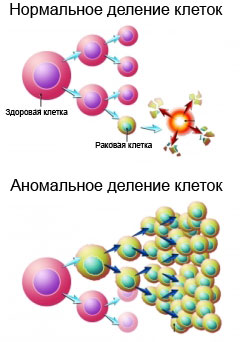Kidney cancer – Renal-cell carcinoma
Description of kidney cancer
Kidney cancer is a disease, in which cancer cells develop in the kidneys. Kidneys – two bean-shaped organs, located just above the waist, on both sides of the spine. Their main function is to filter blood and produce urine, with their help, the body gets rid of toxins and excess water.
Cancer occurs, when the cells of the organism (in this case kidney cells) begin randomly divided. The result is a mass of tissue, called a growth or tumor. The term cancer refers to malignant tumors, that can invade nearby tissues and spread to other parts of the body.
There are two main types of kidney cancer: Wilms' tumor, which occurs predominantly in children, and renal cell carcinoma in adults. The cells, cancer cells lining the ureters can also arise, and sarcoma can occur in the connective tissue of the kidneys (rarely).

Causes of kidney cancer
The cause of kidney cancer is unknown.
Risk factors for kidney cancer
Factors, which increase the risk of kidney cancer:
- Smoking;
- Family history of some hereditary forms of kidney cancer;
- Age: 50 and older;
- Paul: male;
- Some occupational exposures (eg, contact with asbestos and aniline) and work in leather production;
- Exposure to certain toxins;
- Balkan jade;
- Chronic kidney stones;
- Phenacetin abuse;
- Tuberous sclerosis – this is a hereditary disease, which causes tumors in various organs, including renal angiomyolipomas, benign tumors;
- Dialysis;
- Von Hippel-Lindau syndrome – syndrome, associated with many types of cancer.
Symptoms of kidney cancer
Symptoms include:
- Blood in the urine;
- Unexplained lower back pain or pain elsewhere;
- Shortness of breath or cough;
- Feeling of a lump in the stomach;
- Elevated blood pressure;
- Unplanned, significant weight loss;
- Unexplained fever;
- Swelling of ankles, leg and/or life.
Diagnosis of kidney cancer
The doctor will ask about your symptoms and medical history, and perform a physical exam.
Tests may include:
- Blood and urine tests – to test kidney function or look for substances, which indicate the presence of kidney cancer;
- A bone scan – special radioactive material is used, which accumulates in the bones, in place of, where is the active process taking place?, such as tumor growth. Kidney cancer often spreads to the bones. This test is often performed, to make sure, that the cancer has not spread to the bones;
- Chest X-ray and X-ray of the abdomen – tests, that use x-rays, to take pictures of organs inside the body;
- Intravenous pyelogram – X-ray of the kidneys and ureters after the injection of contrast dye into the bloodstream;
- Renal angiography – x-ray of arteries, which lead to a possible kidney tumor;
- CT scan – X-ray views, which uses computer, to take pictures of the kidneys and surrounding organs;
- MRT – test, which uses magnetic waves, to take pictures of the kidneys and surrounding organs;
- US kidney – test, which uses sound waves to study the renal;
- Laparoscopy – a thin tube inserted through a small incision in the abdominal cavity, to have your kidney examined;
- Cystoscopy – inspection of the bladder, ureters and kidneys through a thin tube, which is inserted through the urethra;
- Biopsy pochki – removal of a sample of kidney tissue to test for cancer cells.
Kidney cancer treatment
After kidney cancer is detected, an examination is carried out, allowing to determine the extent and scope of cancer. The treatment method depends on the stage of cancer.
Surgery is the most important component of kidney cancer treatment. There is some information, indicating the effectiveness of immunotherapy (interleukin or interferon). Radiation may be used to treat kidney cancer, which has spread to the lungs, bones or brain, but this procedure is not considered effective enough.
Surgery for kidney cancer
The procedure involves removing the cancerous tumor, and surrounding tissues, perhaps, neighboring lymph nodes. Surgeries to treat kidney cancer include:
- Radical nephrectomy – removal of the entire kidney, adrenal, adjacent adipose tissue and lymph nodes;
- Partial nephrectomy – removal of only the cancerous part of the kidney. Used to treat small tumors, which have not spread to other organs;
- Removal of metastases – removal of cancerous tissue, which has spread to other parts of the body.
Radiation therapy (or radiotherapy)
The procedure involves the use of radiation, to kill cancer cells and shrink tumors. Used External radiation therapy – radiation is directed at the tumor from a source outside the body.
Chemotherapy for kidney cancer
Chemotherapy – the use of drugs to kill cancer cells. Preparations for the chemotherapy may be given in various forms: tablets, injection, the introduction of a catheter. The drugs enter the bloodstream and spread throughout the body, killing mostly cancer, and also some healthy cells.
Immunotherapy for kidney cancer
The procedure includes the use of onions, such as interleukin-2 and interferon-alpha, to help the immune system fight and destroy cancer cells.
Targeted therapy for kidney cancer
Targeted therapy involves the use of drugs, called tyrosine kinase inhibitors. The most commonly used drug is sunitinib. (Sutent) and sorafenib (Nexavar). These drugs improve survival rates in kidney cancer patients. Another class of drugs, called selective mTOR inhibitors (targets of rapamycin in mammals) may also help people with kidney cancer. An example of this type of medication is temsirolimus.
Taking medications for kidney cancer
Preparations, which may be prescribed for adults with advanced kidney cancer:
- Everolimus (Zortress);
- Pazopanib (Votrient).
Prevention of kidney cancer
Measures to prevent kidney cancer are quite limited:
- Avoid using tobacco products;
- Avoid exposure to hazardous substances at work.
See your doctor at the first sign of possible symptoms, since early detection of kidney cancer is a key factor in successful treatment.
